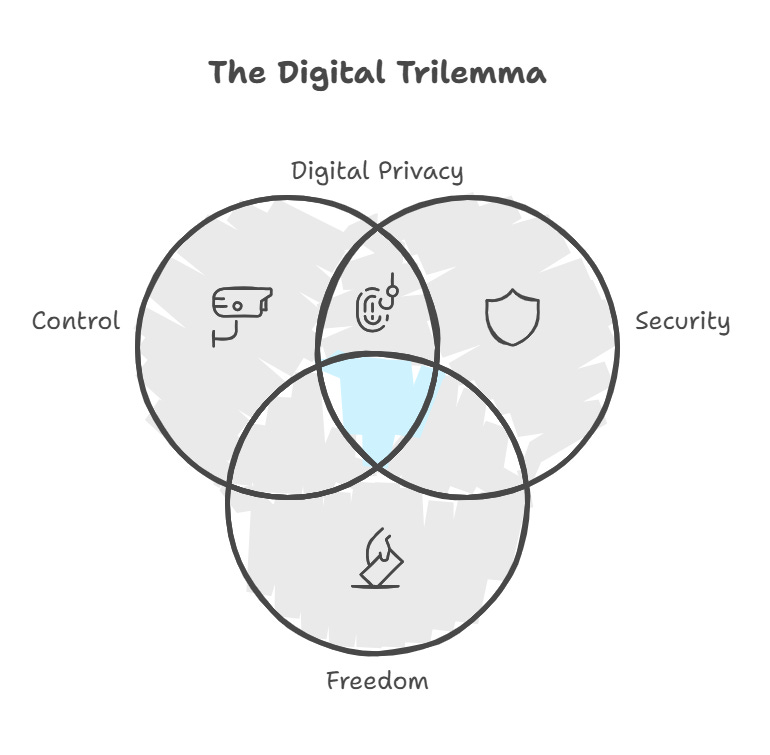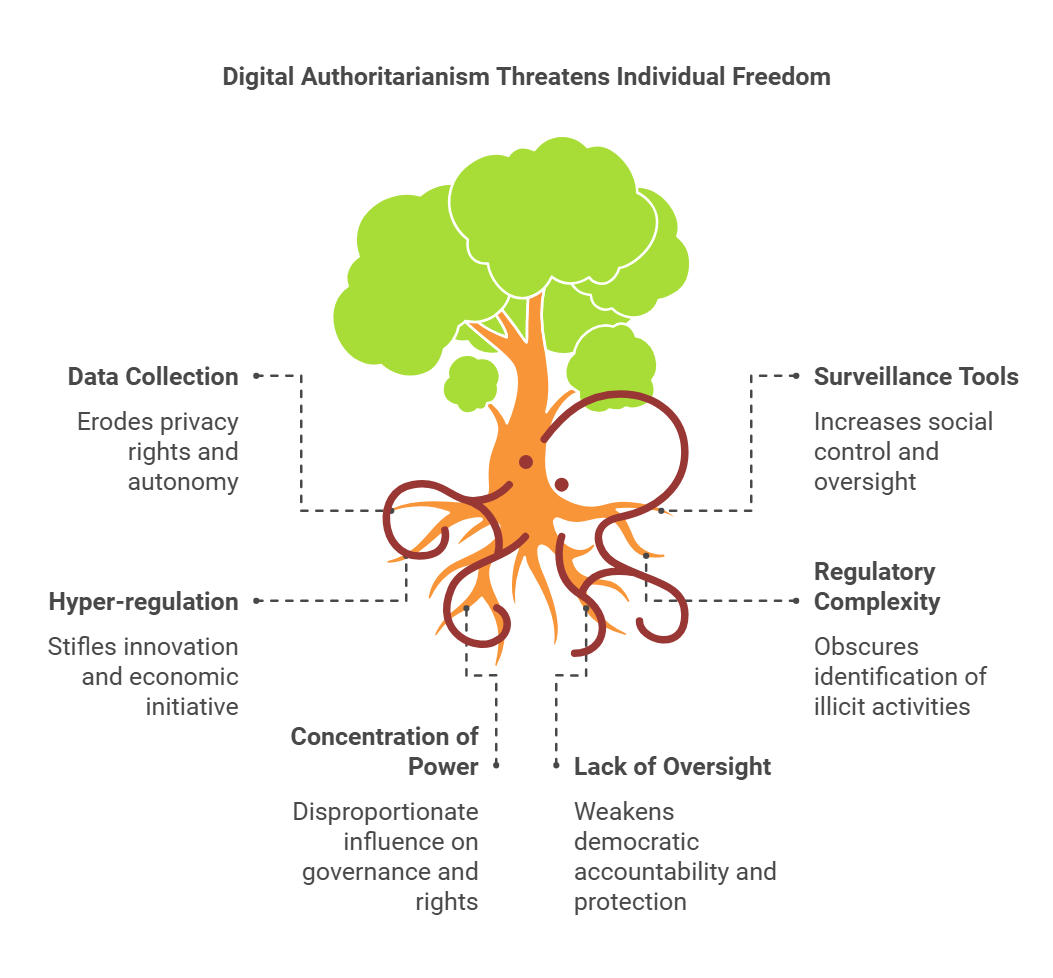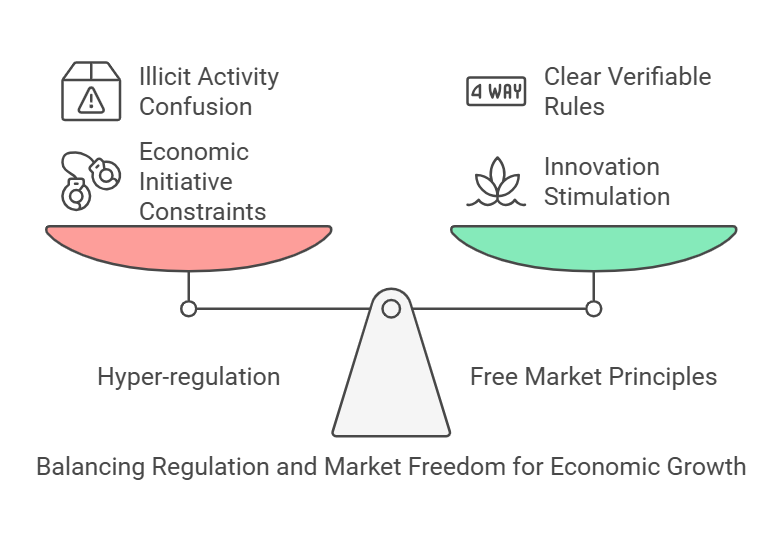The Digital Trilemma: Finding Balance between Control, Security, and Freedom in the Mass Surveillance Era
In the era of pervasive digitalization, a new paradigm emerges that creates tension between three fundamental elements: institutional control, collective security, and individual freedoms. This trilemma highlights the complex challenges facing contemporary society.
Control, exercised by governments and large tech companies, manifests through sophisticated surveillance and monitoring tools that threaten citizens' privacy. Security, invoked as justification for invasive measures, clashes with the need to preserve personal freedom in online and offline spaces. Individual freedoms, including digital privacy, are under constant pressure in a technological ecosystem that favours mass profiling.
Globalization, with its opportunities and contradictions, has been at the center of economic and political debate in recent decades. In his book "The Globalization Paradox" (2011), Dani Rodrik introduced the "world economy trilemma," highlighting the incompatibility between democracy, national sovereignty, and hyper globalization. However, the technological and social transformations described by authors like Klaus Schwab ("The Fourth Industrial Revolution," 2016) and Shoshana Zuboff ("The Age of Surveillance Capitalism," 2019) have redefined global challenges, leading to a new reflection on the role of security, control, and individual freedom in the digital age.
Rodrik's Trilemma: Democracy, Sovereignty, and Hyperglobalization
Rodrik argues that it is impossible to simultaneously pursue political democracy, national sovereignty, and deep global economic integration. For example:
Hyperglobalization: Requires uniform rules that limit the autonomy of national governments.
National sovereignty: Allows states to protect their own interests but can hinder international cooperation.
Political democracy: Ensures decisions are made based on citizens' needs but risks conflicting with rules imposed by globalization.
Rodrik proposes a "smart globalization" that moderates the expansion of global markets to preserve governments' ability to protect their social contracts. The crisis of the "Washington Consensus" and growing inequalities demonstrate that unregulated globalization risks destabilizing both economies and societies.
The Fourth Industrial Revolution: Opportunities and Risks
Klaus Schwab describes the fourth industrial revolution as an era of unprecedented technological transformations, characterized by artificial intelligence, advanced robotics, biotechnologies, and digital interconnection. These changes offer extraordinary opportunities to improve human well-being but also involve significant risks:
Economic inequalities: Technology can concentrate wealth and power in few hands.
Technological unemployment: Automation could replace millions of traditional jobs.
Insufficient governance: Governments struggle to regulate technologies evolving at exponential rates.
Digital security: Interconnectedness increases vulnerability to cyberattacks.
Schwab emphasizes the need for collaborative governance that transcends national boundaries to manage these changes in an inclusive and sustainable manner.
Surveillance Capitalism: Individual Freedom Under Attack
Shoshana Zuboff analyzes how digital capitalism has transformed personal data into a primary economic resource. Large tech companies collect enormous amounts of information about individuals to predict and influence their behaviours. This model raises fundamental concerns:
Loss of privacy: Individuals have less and less control over their personal data.
Social manipulation: Algorithms can condition political opinions and consumption choices.
Concentration of power: Dominant digital platforms exercise disproportionate influence on economies and societies.
Zuboff calls for rethinking the relationship between technology, economy, and democracy to protect individual freedom in the digital age.
The Cypherpunk Movement and the Fight for Digital Freedom
The Cypherpunk movement, articulated in its 1993 Manifesto, foresaw many of the challenges we face today, advocating for cryptography as a crucial tool for preserving privacy and freedom in the digital world.
Cypherpunks emphasize the necessity of systems that enable the sharing of minimal personal information and oppose regulations that restrict cryptographic practices.
However, the implementation of privacy-enhancing technologies presents complex dilemmas. On one hand, these technologies empower individuals to safeguard their digital autonomy; on the other, they may impede legitimate public security efforts, potentially creating blind spots for illicit activities.
The increasing collection of data by corporations and governments, while providing personalized services and enhanced security, poses serious threats to privacy rights. Digital surveillance tools, such as facial recognition and online behavior analysis, raise significant concerns regarding individual freedom and social control. This trend is contributing to a form of "digital authoritarianism," characterized by the pervasive use of automated control systems that undermine internet freedom.
Conclusion
To address these challenges, a sophisticated approach to digital governance is necessary—one that balances collective security with the protection of individual rights. This requires the development of regulatory frameworks that recognize the importance of privacy, the adoption of privacy-preserving technologies, and the implementation of robust democratic oversight mechanisms.
Hyper-regulation and hyper-taxation, rather than benefiting citizens, risk becoming constraints on economic initiative and innovation. Moreover, the sheer volume of regulations may make it increasingly difficult to identify truly illicit activities, allowing those currently in power to gain advantages due to their access to top professionals and influence within the corridors of power.
A path toward finding the right balance necessarily involves reducing state intervention, fostering community engagement, and establishing clear and easily verifiable rules. Emphasizing free market principles can stimulate innovation and economic growth, allowing individuals and businesses to thrive without excessive regulatory burdens. Additionally, a sound money will not only protect individual rights but also foster a resilient economy capable of adapting to the challenges of the digital age.
References
• Hughes, E. (1993). A Cypherpunk's Manifesto. Retrieved from https://www.activism.net/cypherpunk/manifesto.html
• Rodrik, D. (2011). The Globalization Paradox: Democracy and the Future of the World Economy. W.W. Norton & Company.
• Helleiner, E. (2019). The life and times of embedded liberalism: legacies and innovations since Bretton Woods. Review of International Political Economy, 26(6), 1112-1135.
• Zuboff, S. (2019). The Age of Surveillance Capitalism: The Fight for a Human Future at the New Frontier of Power. PublicAffairs.
• Schwab, K. (2016). The Fourth Industrial Revolution. World Economic Forum.
• Stiglitz, J. E. (2018). Globalization and its Discontents Revisited: Anti-Globalization in the Era of Trump. W.W. Norton & Company.




